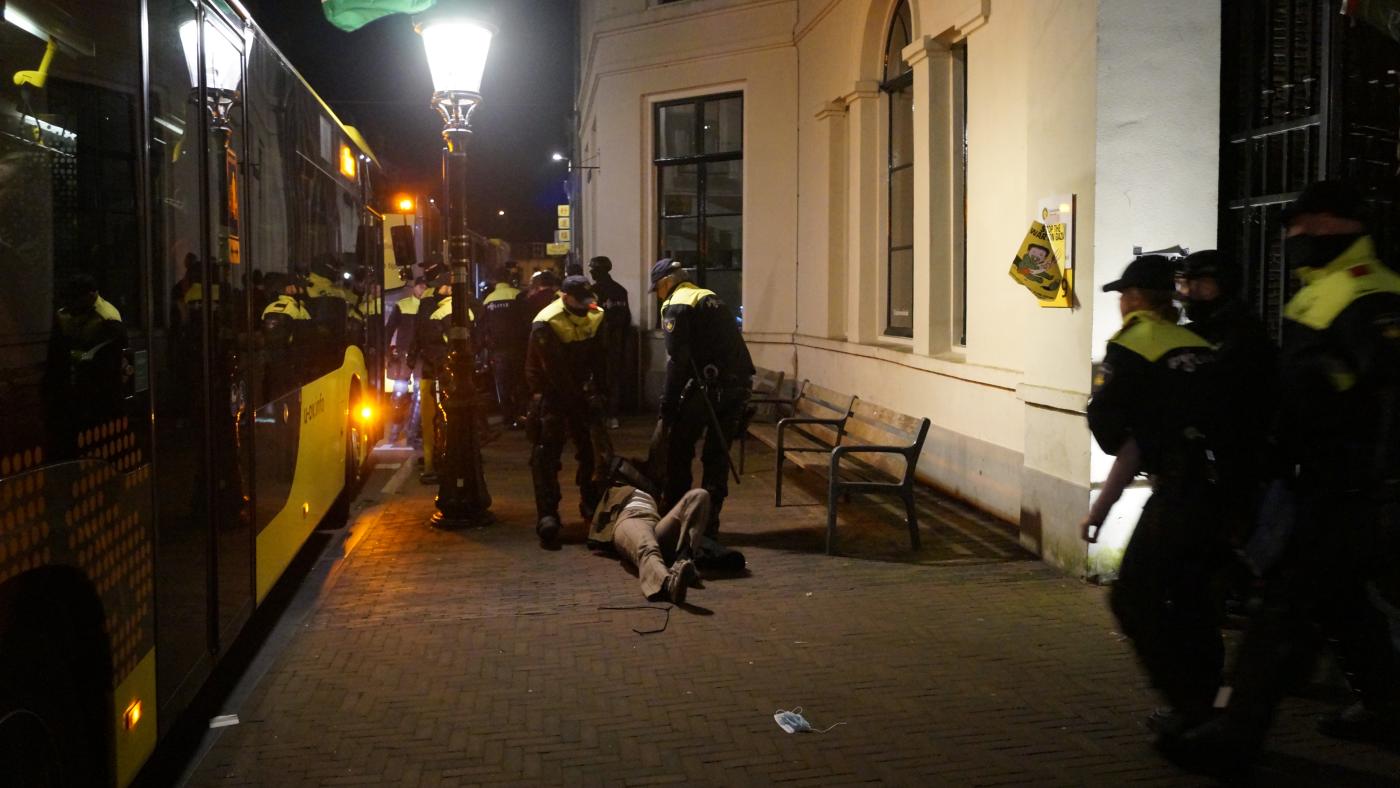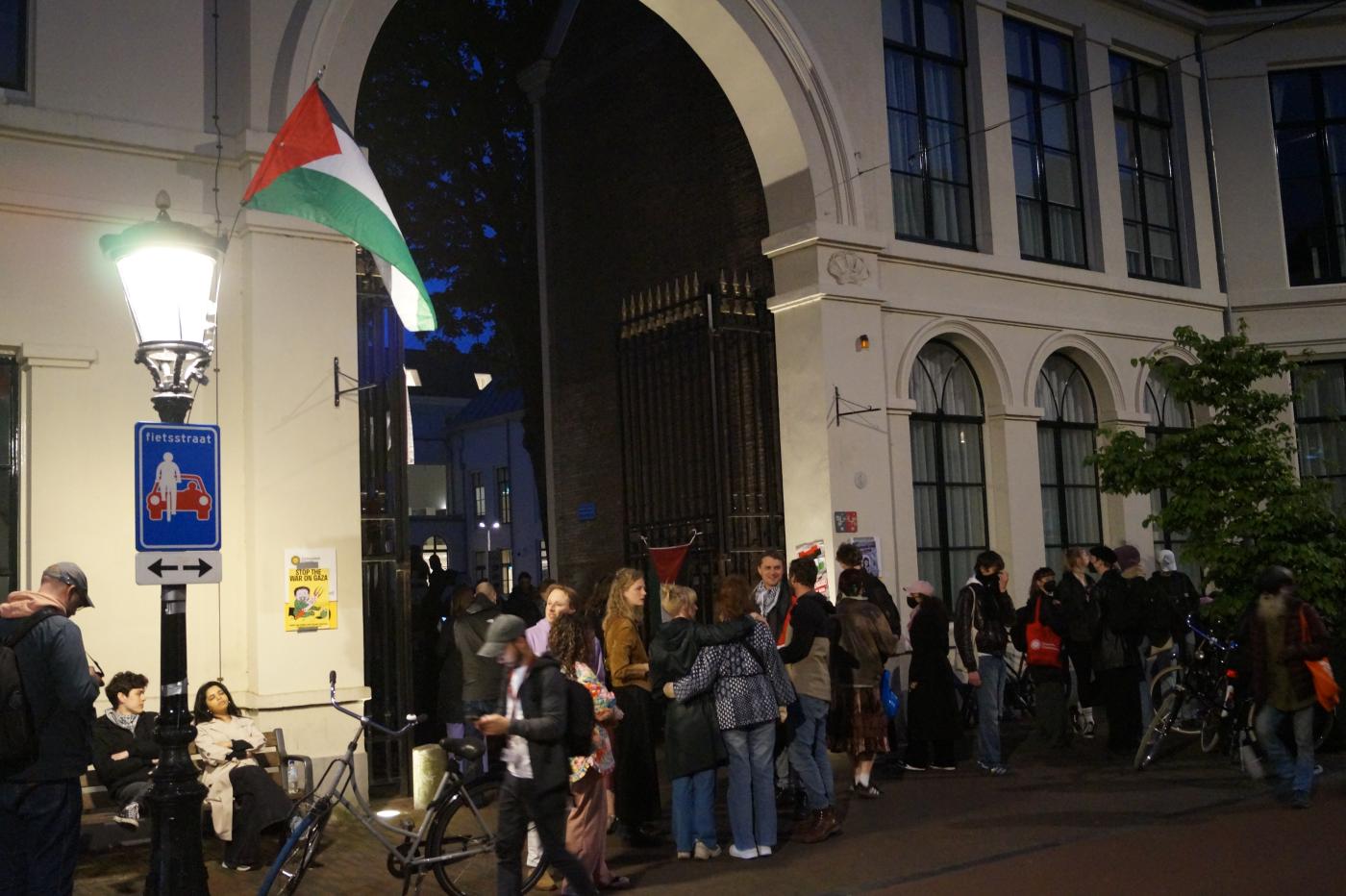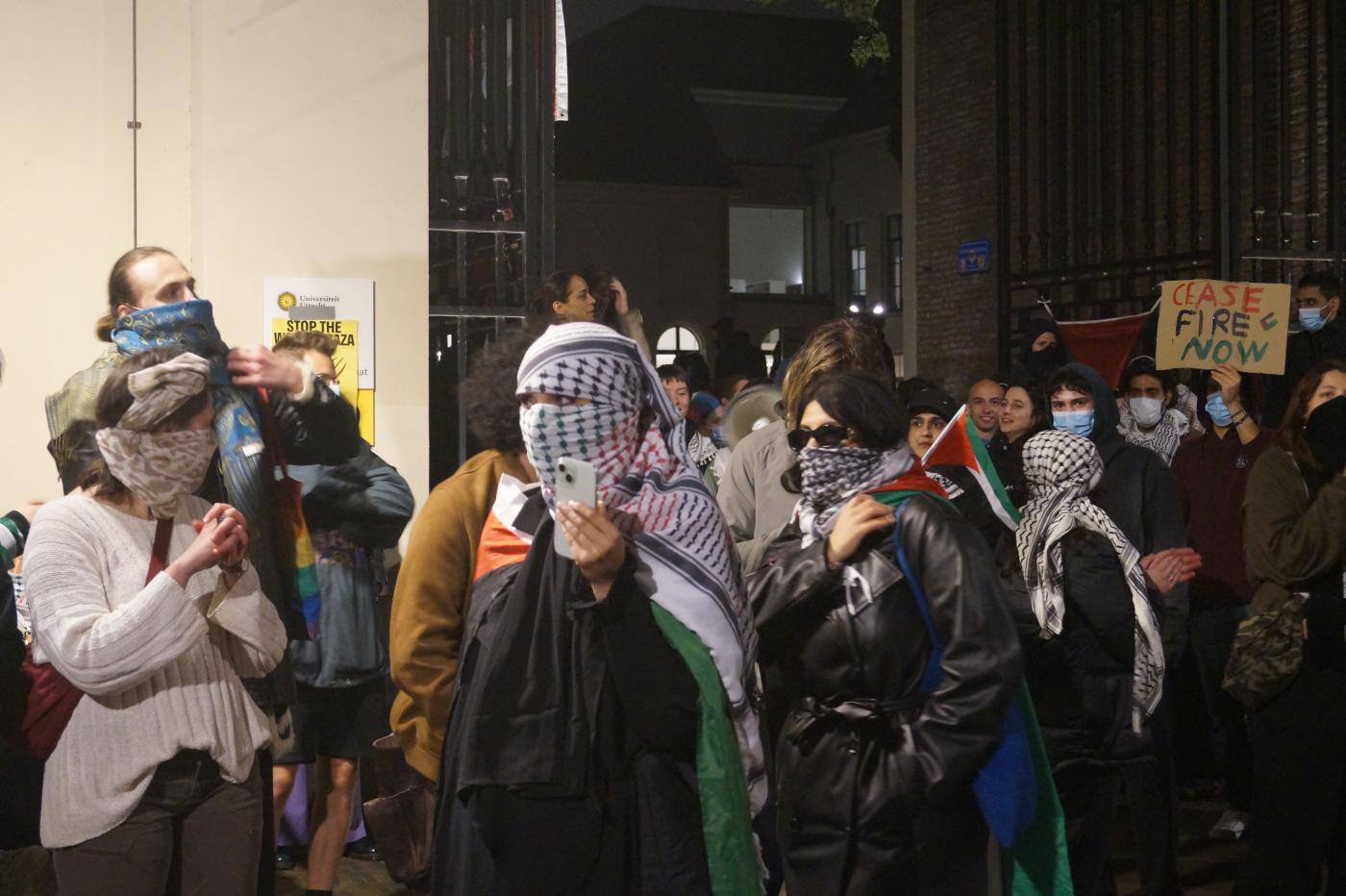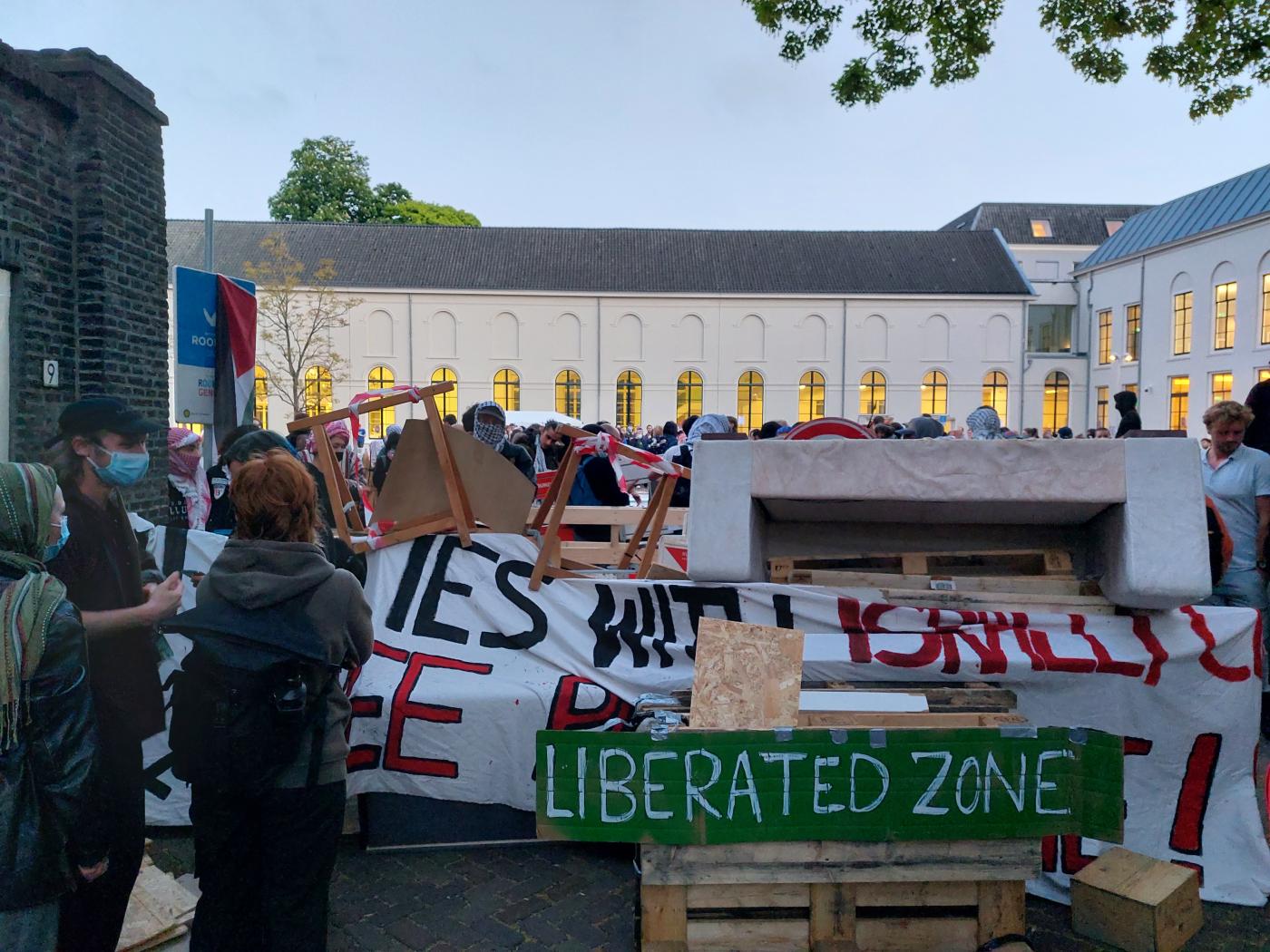Parent of UU student writes a letter to the Executive Board
'Please don't send the police or bulldozers against our protesting daughter'

Dear members of the Executive Board and concerned staff and students of Utrecht University,
I am writing this letter to you as the parent of a child who is enrolled as a first-year student at Utrecht University.
Introduction…
As a family, we are greatly concerned with the situation in Israel and Palestine. We know victims on both sides of the conflict. From friends in Israel we heard first-hand the traumatic account of a student daughter who attended the Supernova music festival on October 7. She had to run for her life, saw the most horrific things and lost friends. We also know academics from Gaza City. Already in the first week of the Israeli offensive, their university, and therefore their life's work, was destroyed. We haven't heard from them in months. We are deeply concerned about their fate.
At the courtyard…
Our eldest daughter, a first-year student at Utrecht University, is also very concerned about the situation there. And in particular with the fate of the Gazan civilian population, which is suffering so much from the actions of Israel and the Israel Defence Forces (IDF), which in her opinion can be qualified as genocide. She is one of the protesting students who sat in the courtyard of the University Library on Tuesday evening, May 7. While she sat there in a circle with fellow students, peacefully clapping, chanting, singing and talking, I wrote a concerned e-mail to the members of the Executive Board of Utrecht University:
“For us as parents, this is quite unnerving, given the violent outcome of the previous demonstration at the University of Amsterdam. […] We especially hope for de-escalating action from the Executive Board. Simply put: we have, in a sense, entrusted our daughter to the care of Utrecht University. Please don't send a bulldozer at her! We hope for mildness, reasonableness, wisdom and compassion on the part of your Board, both substantively in dealing with the demands of the demonstrating students, and relationally in dealing with the demonstrating students themselves.”
Unfortunately, the course of events at the courtyard took another turn. A few hours later, in the middle of the night, we got a phone call from our daughter. She and her fellow students had been arrested, evicted and administratively displaced to a location in Houten by the riot police. There they were dropped, without explanation or instruction. My wife drove to Houten and picked our daughter and three other students up, to spare them a two and a half hour walk. It was clear to my wife that these students were all overwhelmed, affected and overcome by what just had happened to them. It was clear to them they would need some time – days – to recover and recuperate from this whole experience.
I hear politicians ask for harsher punishment, but believe you me, this approach is repressing enough in its effect. Way more repressing, I should say, than is acceptable in an open democracy. My daughter at least, despite of her passion for the cause, decided to stay low key for the rest of the week, not putting herself in situations where she might get arrested again: “getting arrested once is more than enough for a week”, she said. Other students who initially wanted to protest, got too scared to do so, after they saw wat had happened to their fellow students (chilling effect). I see this as an undesirable and unacceptable inhibition of her right to demonstrate. In the next days we heard stories of her and others about what really happened when the riot police started the eviction. I did not expect the riot police to treat the students with kid gloves, but I was baffled and shocked by the amount of unnecessary, excessive, sadist, injuring and probably partly illegal violence and aggression they used (while withholding medical care) to evict these utterly non-resisting, non-violent children.
Children…
Because that is what they are to us, as parents: children. They might think of themselves as grown-up adults, mature and responsible – I know I did when I was a student – and in many ways the university has to treat them as such – in fact, that is a large part of their initiation into adulthood – but we as parents know better: they are also still children. Our children, that we deeply love and care about. When they leave the family nest to go to university, we as parents hand over a large part of our parental care to their new environment: their fellow students, their teachers and mentors, and not the least to the institution where they are enrolled.
It is this institutional care that, in my e-mail, I called upon the members of the Executive Board to exercise in their dealing with the demonstrating students. Again: we as parents entrust our children to the care of Utrecht University. We feel that this trust has been breached by the decision of the Board to take a path that would inevitably lead to the deployment of the riot police against our peacefully demonstrating children. The Board claims to have “felt compelled to act in this way” because they “could not guarantee the safety of the protesters”. As parents we keep wondering: what about the protest could possibly be more unsafe for our children than being exposed to an eager and aggressive platoon of riot police, armed with batons, pepper spray and what not.

Staff…
As disappointed as we are in the Executive Board, so profoundly grateful we are to the University staff members, who stood by the students during the whole demonstration, moderating the event and taking care of the students wellbeing. We understood from our daughter that when at the library courtyard the charge by the riot police was anticipated, several staff members formed a protective human chain between the riot police and the students, willing to take the first beatings and doses of pepper spray, while probably being just as terrified as the students. They were hoping that their presence would calm the police – which it didn’t. The amount of commitment, care and love these staff members displayed towards their students, our children, is way beyond just their professional responsibility. Again, we as parents are deeply grateful to them. As caring as the staff members were throughout the protest, the Board nevertheless deemed the situation unsafe, and apparently thought that the students were in better hands with the riot police than with their own university staff. To be honest, we can only see this as an outright distrust of the Board in their own staff, that was apparently regarded uncapable of keeping the situation on the right track. Again this makes us wonder: to what kind of organization do we entrust our children to, where the board has so little confidence in their own staff? I mean, should we as parents also be worried, knowing that our children will be around such apparently untrustworthy staff members for the next couple of years?

Face-covering…
Another issue we as parents are concerned about is the ban on face-covering clothing that Utrecht University still has in place. To be honest, at first we ourselves found this use of face-covering clothing to be intimidating. If you want to enter an open dialogue, we thought, you should make yourself known, so your debating partner knows you, and from what position you are arguing. That way the debate can be both safe and clear.
But then our daughter told us why the demonstrating students deemed anonymity necessary. First, more and more demonstrations like this are under police surveillance (and who knows who else’s surveillance), using all kinds of modern technology like facial recognition software. According to Amnesty International this has already been misused in the Netherlands, profiling demonstrators, and actively intimidating them.
Second, video’s and images of the demonstrating students and staff are made and distributed on social media on a large scale, by different, uncontrollable actors. Extremist far right groups use this material to identify people and harass, intimidate and assault them, both online and physically. This happens. Ask the staff and students about their experiences in this regard.
Third, people may be in a vulnerable position. Recognition might get them into trouble (like visa, refugee status, etc.).
Fourth, foreign students and staff from unsafe countries, or their families abroad, may suffer grave consequences or get in serious danger if they are recognized. For some of them it can be a matter of life and death. So, in order to prevent that demonstrators who for their safety have to rely on face-covering cannot be singled out, everyone is asked to voluntarily wear face-covering. When we heard this, we were both shocked that this is the new reality, and convinced of the necessity of face-covering.
‘So surely’, we asked our daughter, ‘if you communicate this to the Board, they will undoubtedly lift the ban?’ ‘Oh, but they do know’, she replied, ‘and they still deny us the right to protest anonymously, which by the way is a fundamental human right, laid down in the ECHR’. If that is true, we, as parents, find this not just unreasonable, but downright malicious. Again we have to ask the Board: why are you exposing our children to this kind of dangers, by sticking to this house rule?
Dialogue…
I would like to share one other parental observation. I hear the minister of education, culture and science call for dialogue and debate instead of disobedient protest. But I believe that the complaint of the demonstrating students and staff is that exactly that is what is missing. My daughter told me that in the time frame of seven months a delegation of the organizing groups only got one meeting with the Board, for just 40 minutes – less than the time of one lecture. If that is true, that is not enough. Dialogue should be ongoing. A few months ago I heard a university professor state that universities have to be intellectually ultimately unsafe, and socially ultimately safe. My impression, be it from my limited outside perspective as parent, so I might be very wrong, is that at Utrecht University this seems to be currently the other way round. The debate about the conflict in the Middle East, and how Utrecht University should relate to it, seems to be in a way kept intellectually safe, by fending off certain debating positions (in general or from each other), and is at the same time – perhaps as a consequence – socially unsafe, as is referred to by the Board in their press release about the recent events.
At the family dinner table…
There has however for the past few years been an ongoing debate at our own family dinner table. Our daughter on the one hand often has quite outspoken views, while my wife and I on the other hand are more the nuanced ‘on the one hand, on the other hand’ type of persons. And we often clash at our dinner table: ‘How can you say that?’ Our way of dealing with this is to try to keep these debates intellectually ultimately unsafe, and socially ultimately safe. The latter is a condition for the first, but also, the latter results from the first. That is: all ideas, arguments, theories, viewpoints and paradigms that one of us holds, must be open to criticism. All participants should be willing to be receptive of criticism, and willing to be changed by the encounter with other viewpoints. If executed properly and persistently, this leads to increased mutual understanding, and therefore to increased social safety. That’s how it should be at an academy as well, in my opinion. It can’t be, like it seems to me now, that our family dinner table is a better place for academic debate, than the academy of Utrecht University itself, which should be the proper place.
Educated…
Oh, and one more thing about our family dinner table debates. Each time I am surprised at how educated our daughter is on the subject of the Middle East. In her first year, she has learned a lot from her teachers. They inspired her and gave her the tools to acquire scientific knowledge. She uses many free moments to read scientific literature, essays and articles and to listen to podcasts from experts. Quite often I have to do some serious studying, to be able to verify or dispute her arguments. And then she tells me that some of her fellow students know way more! My impression is that the university staff is doing a great job in turning our children into knowledgeable and skillful academics. They know their stuff (and so the more their teachers). So please, members of the Board, take your students, our children seriously! Converse with them, instead of putting them in front of a riot police platoon. If you ask the right questions you’ll discover that their underlying understanding of the situation goes way beyond the one liners they chant in the streets.

Demands...
To sum it all up: we, as parents, have a few requests, no, scratch that, demands, for the members of the Executive Board.
One: Talk to the students and staff members that have had to face the riot police. Talk to each and every one of them. Respect their anonymity if they so desire. Ask them what it has been like. We want you to hear the stories that we as parents have had to hear. And also: ask them what they believe in, what motivates them to such an extent, that they were willing to undergo and endure all that has happened to them.
Two: After having done so, our next demand will be blatantly obvious: never ever again send riot police to non-violent, peacefully demonstrating students!
Three: Respect and facilitate all fundamental rights that come with the right to demonstrate, such as those laid down in the ECHR, and do so in the most generous way. Do not put house rules above those rights. Speaking of rules, I would like to paraphrase the Dalai Lama: one can also uphold and honor the rules by deviating from them, when the wholesomeness of the situation asks for it, if it is done in the full awareness that one, on behalf of the situation, deviates from rules that at the same time formally still remain in place.
Four: Ensure and facilitate an ongoing dialogue: intellectually ultimately unsafe, socially ultimately safe. These two are interdependent. If there is not enough social safety, as is now felt by diverse groups of students, that means that there is not enough encounter, not enough non-violent dialogue, not enough academic debate going on. Do what is necessary to make it possible that in all social safety, viewpoints can be unsafe, and in all intellectual unsafety, people can be safe. On all levels, including the level of the Board itself.
Five: Appreciate and value involved staff members, for their commitment and loyalty to and care for the cause, the academy, their own conscience, and their students. Especially appreciate and value those staff members that took effort to keep your students, our children, safe during the protest, at their own expense. Care for them.
Six: Please be careful, mindful and compassionate for your students, our children.
Two final remarks…
In this letter I refer to ‘we, as parents’. That includes at least me and my wife. But I can imagine other parents as well can see their own thoughts and feelings reflected in what I have written. If so, I would like to invite those parents to come forward, and voice their concerns, maybe find ways to endorse this letter, or get in touch with each other.
It is tempting to put forward my own position in the debate on an academic boycott. I will refrain from that in this letter, to keep the message clear. Nevertheless, my thoughts and prayers go out to the people in the Middle East, at this time especially those in Gaza. I keep praying, hoping and striving for equal justice and peace in the region.